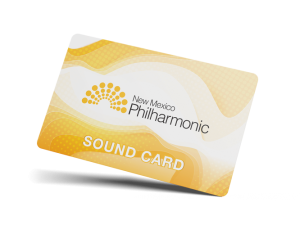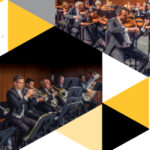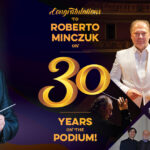Pyotr Ilyich Tchaikovsky
Born 1840, Votkinsk, Russia Died 1893, St. Petersburg, Russia
Symphony No. 5 in e minor, Op. 64 (1888)
The subject of program music inevitably seems to make its way into the discussion of any Romantic composer, and Tchaikovsky is no exception. His opinion on the subject was that no music can be expressly defined as absolute, although he was hesitant to publish detailed programs for his works, à la Berlioz. His patron, Nadezhda von Meck, requested that he write a program for his Fourth Symphony which he dedicated to her. It was this program that kept the symphony from being widely accepted by critics and musicologists for many years after its premiere. For the Fifth Symphony the following “program” was found in early sketches for the piece: “Programme [for] 1st movement of symph[ony]. Intr[oduction]. Complete submission before Fate—or, what is the same thing, the inscrutable designs of Providence. Allegro. Murmurs, doubts, laments, reproaches against … XXX II) Shall I cast myself into the embrace of faith??? A wonderful programme, if only it can be fulfilled.” The meaning of XXX is disputed by musicologists; some see it as a code for Tchaikovsky’s struggle with his homosexuality, while others feel it merely represents various emotions that Tchaikovsky could not put into words. This program was never intended for public consumption and was not discovered until years after the symphony was published.
Tchaikovsky began composing his Fifth Symphony in May of 1888 and conducted its premiere in St. Petersburg that same year. Similar to the Fourth Symphony, the Fifth Symphony is cyclical, meaning that themes are shared between movements. Also similar to the Fourth Symphony, the first movement opens with a six-measure “Fate” motto, but unlike the Fourth, this theme recurs in all four movements in various forms (a technique first used in his Manfred Symphony of 1885). The “Fate” theme of the Fifth is a doleful melody in e minor played by the clarinets in the introduction to the first movement. After the introduction the movement proceeds in traditional sonata form with several themes used in the exposition, all of which can be found in the development section. Following the climax in the coda, the movement ends by waning into the abyss of the lowest stretches of the orchestra.
The second movement’s stunningly beautiful horn solo is one of Tchaikovsky’s most popular melodies, pirated by Glenn Miller in the form of “Moon Love” and John Denver in “Annie’s Song.” Its “popular” nature notwithstanding, the horn solo is an instrumental aria at its most pure. Tchaikovsky’s words (in French) found at the head of the manuscript are, “o, que je t’aime! o mon amie!” (oh, how I love you! oh my friend!).” He uses the feminine form of friend, amie, and it is speculated that he was referring to his patron, von Meck. The Fate motto appears twice, as ominous minor-key interruptions to the major-mode melody.
The third movement’s waltz melody was inspired by an Italian street song and is the predominant melodic material of the movement. The fleet-footed middle section pays homage to the ballet music of Léo Delibes, which Tchaikovsky greatly admired. The Fate motto appears near the end in an ironic, almost tongue-in- cheek, statement by the bassoon.
The finale opens with a lengthy introduction of the Fate motto in a heroic major-mode setting. This has often been compared to the C Major finale of Beethoven’s Fifth, and Mahler’s oft-used symphonic struggle with good versus evil and dark versus light. The Fate motto is drawn from a passage in Glinka’s opera A Life for the Tsar, the passage tellingly found on the words “turn not into sorrow.” The Tchaikovsky biographers Lawrence and Elisabeth Hanson wrote of the Fate motto turned heroic: “In the Fourth Symphony, the Fate theme is earthy and militant, as if the composer visualizes the implacable enemy in the form, say, of a Greek god. In the Fifth, the majestic Fate theme has been elevated far above earth, and man is seen, not as fighting a force that thinks on its own terms, of revenge, hate or spite, but a wholly spiritual power which subjects him to checks and agonies for the betterment of his soul.”




